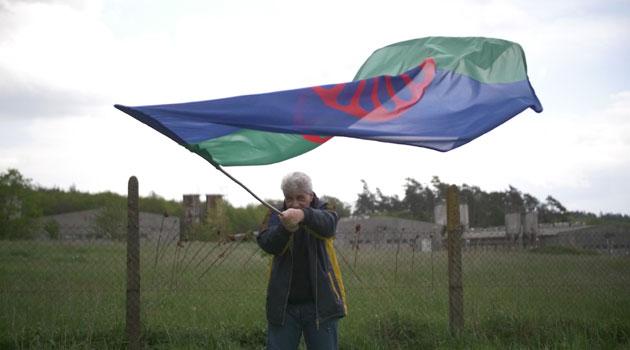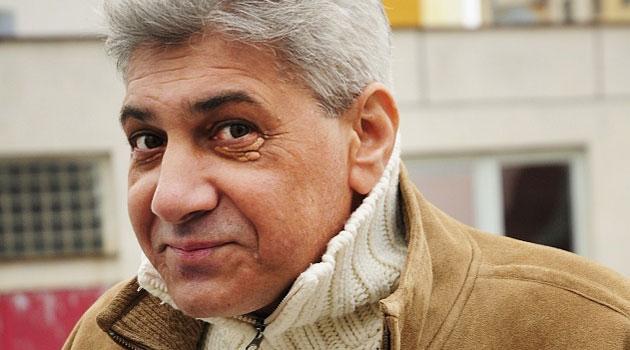Documentary film about Romani activist Jožka Miker brings his energy to the screen

The following article is reprinted from the summertime double issue of the magazine Romano voďi. It was published prior to the Czech Government officially announcing it would be buying the pig farm at Lety.
The site of the former concentration camp at Lety u Písku in the Czech Republic is one of the few locations in the world still waiting for a dignified memorial. Jožka Miker, the subject of the documentary film “JOŽKA” by Berlin-based director Hamze Bytyci, is a Romani activist who has long sought to see the pig farm located on that site removed from the place where part of his wife’s family and most indigenous Czech Romani people perished under inhumane conditions during WWII.
Despite the fact that at first glance Miker seems like the quiet sort, his life’s aim is to see a dignified memorial to the memory of the Romani victims built on the former concentration camp site in South Bohemia. He spent more than 30 years working hard in the coal mines and is now enjoying a well-deserved retirement.
In just a few moments the film leads the viewer into the center of his quixotic battle. Despite the countless failures of various initiatives to get the farm removed, his character gives us hope that his tireless efforts make sense.
The Romani activist says that what he most regrets is that he is unable to light candles for the dead at the fishpond located on the land occupied by the pig farm where, according to him, newborns were drowned by the gendarmerie who guarded the camp. “Here we have our beautiful memorial,” he says, peering through the barbed wire fence around the farm.
“This is how much the Czechs respect us,” he says, gesturing in the direction of the industrial farm which began to be built during the 1970s and which, after the 1989 Velvet Revolution, was privatized by the state even though the terrible past of the location was well-known. From the expression in his eyes we can read his conviction that the Czech Government, after years of considering whether to buy out the farm and remove it, really owes this to the Romani prisoners who were forcibly kept in the cruel conditions of the camp and from which more than 400 were sent to die in the gas chambers on the basis of a directive from 10 July 1942 as part of the Nazis’ “Final Solution”.
The history of Lety
What began as a labor camp was transformed into a concentration camp not long after it was opened. Lety u Písku was administered by the Protectorate authorities and functioned under the management of the Czech gendarmerie, and Romani people, Romani “half-breeds” and anybody who was believed to “live the gypsy way of life” were deported there.
Most of the Romani prisoners, including children, lost their lives behind its barbed wire as a consequence of the spread of a typhus epidemic caused by conditions that made hygiene impossible and by the starvation diet. The victims have yet to receive a dignified memorial.
A first adjustment in that direction arrived after the Iron Curtain had been taken down: A tentative effort at a stone monument was erected. Ever since, activists, survivors and their family members have attempted to get the nearby farm removed, as according to recently documented evidence it actually covers most of site of the former concentration camp.
No Holocaust like the Holocaust
“JOŽKA” may contribute to this place finally receiving a memorial to the Romani victims of the Holocaust 75 years after the creation of the camp indelibly etched it into history. However, from the perspective of government agents and most of the majority society of the Czech Republic, something that is considered a self-evident necessity for Auschwitz, the Kobylisy Shooting Range, Ležáky and Lidice – a diginified memorial – is still considered unacceptable for Lety u Písku.
Miker is currently participating in debating the issue of how to commemorate the Romani Holocaust, both abroad and in the Czech Republic. He is attempting to appeal to those majority-society members who lack respect for the victims.
Interview with Hamze Bytyci
Q: Where did you get the idea to make a documentary film on this subject in particular?
A: I feel a strong connection to Romani genocide locations and to the places that commemorate this tragedy. In 2009 the chair of the Central Council of German Sinti and Roma, Mr Romani Rose, allowed me to photograph him on a visit to the memorial at Auschwitz-Birkenau. In return, I gave him my word that I would annually organize a Europe-wide gathering of youth there on the occasion of 2 August [International Romani Holocaust Day]. I did that under the auspices of the European network of Romani youth, “TernYpe”. After the memorial to the Romani Holocaust victims was opened in Berlin in 2012, I pushed for a commemorative ceremony to happen there on 2 August annually as well. When I heard about the situation at the locaiton of the former camp for Roma at Lety, I realized that pressure on that issue was necessary to do from Germany and that the current state of affairs would be difficult to change. Our film can be an opportunity to generate such pressure. I think there are not too many people in the Czech Republic and Germany who know about this former camp for Roma – neither the non-Roma nor the Roma know about it. The film “JOŽKA” is the least that I could do to protest.
Q: Did you intend to make Jožka Miker the protagonist from the beginning?
A: From the very beginning. It was roughly clear that the film would be primarily about Lety u Písku. However, it was not at all clear what would happen at Lety and at other locations, all of that developed during the filming.
Q: Why did you choose him?
A: The energy with which he approaches life greatly inspired me from the beginning. Not because he is an activist and has a very personal relationships to Lety. This is mainly about the fact that compared to other members of his generation he is very radical – and his archaic message is that the next generation must be even more radical that he is.
Q: What was your collaboration like? What surprised you the most?
A: I dare say – and I hope he won’t take this the wrong way – that we have an affinity for each other. We work in the same field, so we knew we had to be careful not to overdo it in the film, not to be too biased. The advantage, naturally, was that I did not have to spend a long time explaining to him what I was after with this film. Morevoer, if you have as strong a protagonist as he is, you do not have to have that much talent when it comes to making an interesting film. As a protagonist, he is a gift from Heaven. What most surprised me was that he is, unfortunately, correct about one thing, and that is that most people in the Czech Republic are absolutely indifferent to the subject of Lety u Písku and to the lives of Romani people in general.
TRAILER
JOŽKA: Trailer to the film from RomaTrial on Vimeo.
Q: What kinds of problems did you encounter during filming? Was it easier to film abroad or in the Czech Republic?
A: From the beginning it was not easy for me to cope with the different approaches taken toward the film by the members of our team. For example, our cameraman, Milan Durňak, is an anthropologist of visual culture and that means we each take a rather different approach to filming. However, I am very grateful for the plurality of opinions we had, I think it made the film better. It was also not easy to accept the fact that we were not allowed to film directly inside the farm. The police followed our every move during the filming at Lety – the grounds around the farm are guarded through a CCTV system, so the first police patrol arrived at our film location just a couple of minutes after we did. That angered me. Fortunately, as an “old-school antifascist”, Jožka knows very well how to de-escalate conflict. In the film you can see how well he handled the entire situation, with calm and dignity. I comprehended that I have a lot to learn from him.
Q: What, in your opinion, is the contribution made by this film?
A: I hope it will be, for many viewers, an opportunity to deal with the subject of Lety u Písku. As I said, I see this as a chance to create international political pressure on the Czech Government so the shameful pig farm at Lety will finally be closed and demolished.
Hamze Bytici, the director of the documentary film “JOŽKA”, also works as an actor and a theater educator. He studied acting in Freiburg, where his family found a new home after fleeing Kosovo. In his films and his work as the chair of the RomaTrial group, he is dedicated to sociopolitical subjects such as identity, justice, migration and the persistent discrimination against the Romani minority. He supports both non-Romani and Romani youth in their search for their own identities, for example through his summer school about filmmaking, “Balkan Onions”. He is the initiator of the annual gathering of youth on the occasion of 2 August at the Auschwitz memorial, organizes the 2 August commemorative ceremony in Berlin, and is a member of the Alliance for Solidarity with European Sinti and Roma, which involves more than 20 organizations in combating antigypsyism. Since 2016 he has been a member of the Berlin State board of the Die Linke (Left) party and was elected as a candidate to the German legislature during the 2017 elections.
